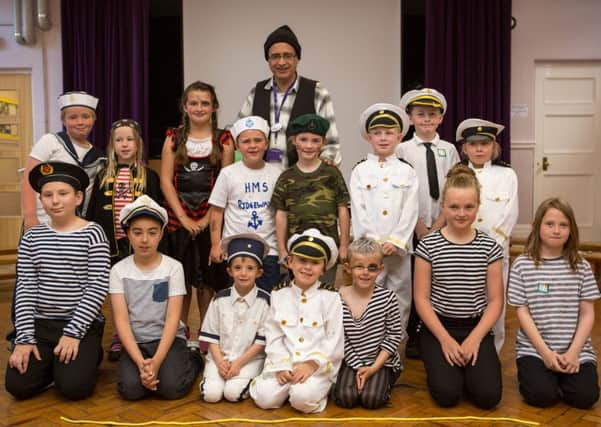Pupils get into nautical theme for heritage project


In partnership with South Shields Marine School, the youngsters at Ridgeway Primary Academy launched themselves into the project by coming into class in nautical-themed outfits.
They became sailors, engineers and captains, with some wearing stripey clothes for a day.
Advertisement
Hide AdAdvertisement
Hide AdIt was part of fun activities in which they were also given posters and stickers by Seafarers Awareness Week organiser, Seafarers UK, the maritime charity that oversees the UK’s maritime environment.
The activity was designed to raise awareness of the important role the UK’s seafarers play in the life of the nation.
Marine school lecturers Josslyne Masters and Captain Jon Milner also spoke to the children about life on the ocean waves and careers at sea.
Due to its participation, the school, which is sponsored as an academy by South Tyneside College, which operates the marine school, was entered into a prize draw to win £500.
Advertisement
Hide AdAdvertisement
Hide AdHeadteacher Michael McCarthy said: “It was a fun but also very educational day of activities.
“South Shields has a long and proud seafaring history and it is important that its young people have an understanding of that and of how the sea has played a role in the lives of generations of its people.
“The children really enjoyed getting dressed up in their outfits and had a great time. I’m very pleased that Ridgeway was able to promote this special awareness week.”
Seafarers Awareness Week’s theme was promoting ‘Maritime Jobs for Future Generations’.
Advertisement
Hide AdAdvertisement
Hide AdIt coincided with Seafarers UK calling on the government and the UK shipping industry to invest in training British Merchant Navy officers to meet a huge manpower shortfall.
A recent report from the International Chamber of Shipping revealed a shortfall of 16,500 deck and engineer officers, with a global shortage forecast of maritime officers standing at 92,000 by 2020 and 147,500 by 2025.
The demand for officers has increased by 24 per cent since from 2010, but the number being trained in the UK largely remaining stagnant, with fewer than 1,000 British cadets each year commencing training for Merchant Navy careers.
Commodore Barry Bryant, Seafarers UK’s Director General, said: “There is an urgent need for serious investment in our young people who want to work at sea, both from the government by allocating more funds for training, and from the shipping industry by ensuring that all British cadets are guaranteed time at sea to become qualified.
Advertisement
Hide AdAdvertisement
Hide Ad“Without increased investment in the UK’s maritime skills base, we will face a serious shortage of men and women who in due course will move from seafaring to shore-based roles, such as port operations, crew manning services, ship broking, chartering and insurance.
“A large part of the nation’s and the City of London’s maritime competence will rely on these future UK seafarers.”
The UK maritime industry directly contributes at least £11bn a year to the UK economy, while supporting over 113,000 jobs.
Seafarers UK provides bursaries for cadets who are keen to work at sea but are prevented from doing so by financial constraints.
Advertisement
Hide AdAdvertisement
Hide AdThe charity believes what is required is a fresh and joined-up approach to making young people aware of our great maritime heritage.
Also the huge importance of the sea to our island nation, and the consequent career opportunities for training to work in the UK’s maritime growth areas.